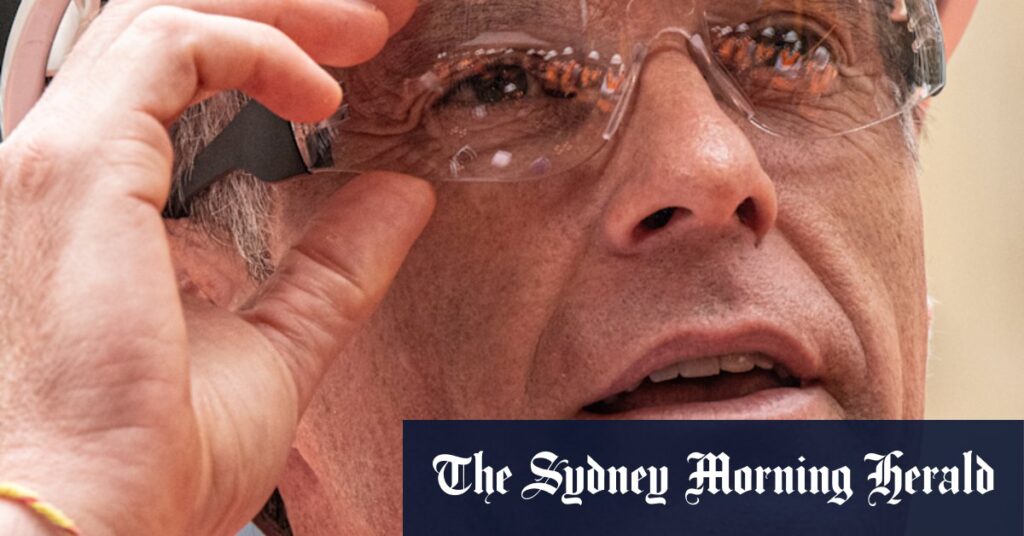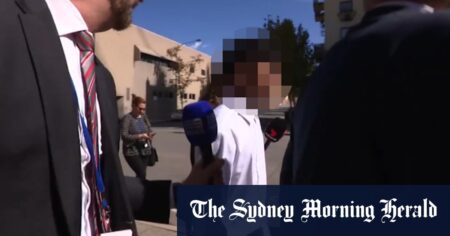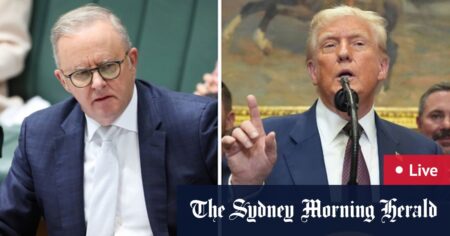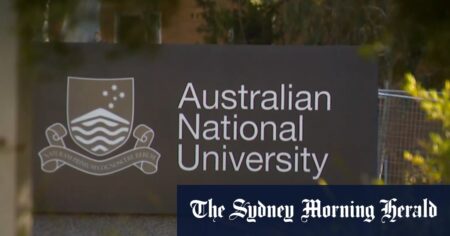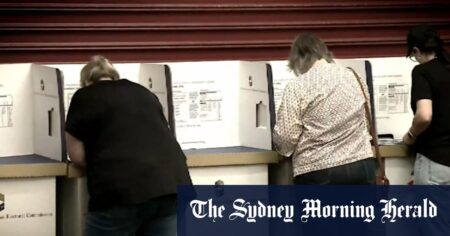Whatever Premier Chris Minns tells us about the NSW budget being unable to pay for extensions to Sydney’s metro (“Future metro rail extensions kicked further down track”, August 13), it remains true that it is far cheaper to fund the rail system than pour money into the road network. Sydneysiders need to move around so let’s swap much of the road funding and put it into rail. Greg Baker, Fitzroy Falls
The state government is sensibly looking into joining the new Western Sydney Airport metro to St Marys with the existing metro at Tallawong. Pity then that the two metro systems won’t be interchangeable because some expert rail boffin decided that the WSA metro trains should be 30cm wider than the existing ones. It might not be too late to change back to the original size metro cars, which have ample room for passengers with luggage. Why do we not take time to plan carefully before committing to spending billions of dollars on major infrastructure projects? Lance Dover, Pretty Beach
It’s a lovely metro, but you can’t have another one yet.Credit: Sydney Morning Herald
Leppington railway station is not far from the terminal at the new airport. Google AI suggests a cost of between $160 million and $1 billion to build 10km of heavy rail in Sydney, depending on whether the build requires tunnels, etc. The land is flat, so no tunnels would be required, and we already have the rolling stock, but let’s say it’s the upper price: $1 billion. The airport cost is quoted at $5.3 billion, and the metro from St Marys is costing $11 billion. The associated roadworks will come in at around $6 billion. Around $22 billion all up. But we don’t have a further $1 billion for the logical connection to the existing rail station at Leppington that is just 10km away? Spare us. Brett Jack, Bonnyrigg Heights
Focus on the endgame
Jeremy Leibler predictably lays the entire blame for the present slaughter of Gazans at the feet of the Palestinians, and correctly on Hamas who are responsible for triggering the latest round of hostilities (“Statehood without reforms will bring more repression”, August 13). However, what caught my attention was the often-made claim blaming Hamas for indoctrination of children with hatred. Just a moment of reflection will make it clear to him that the thousands of children with maimed limbs and the orphans of innocent civilians will find it easier to fuel hatred for an Israel they hold responsible. While the innocent victims killed are an unforgivable crime, the cataclysm facing their surviving children, siblings and kin are fertile grounds for generating hate, the fruits of which will unfortunately further poison our world and make Israel more unsafe. Wounded hearts are not a place that easily allows love to dwell for its perceived enemy. Manbir Singh Kohli, Pemulwuy
Jeremy Leibler is right, recognising a Palestinian state before the terrorist groups are disarmed, and before proper democratic safeguards are in place, could be a grave mistake. His message is reinforced by the lessons of 1948, when the UN recognised Israel before the Jewish paramilitary organisations (Irgun and Lehi) were disbanded. In fact, they were never disbanded, but were integrated, along with the more moderate Haganah, to form the IDF. Even today, 77 years later, Israel does not have effective safeguards for human rights and is unwilling to stop its own citizens from establishing illegal settlements in the occupied West Bank. Worse, the Israeli government has approved these illegal settlements. The Israeli prime minister stands accused of corruption in Israel, and is wanted for war crimes by the International Criminal Court. Recognising a Palestinian state now would be no worse a mistake than recognising Israel in 1948. However, we can learn the lessons of history and provide Palestine with guidance on the establishment of a robust democracy, with safeguards for human rights and respect for the law. We should also pressure Israel to work towards the same ideals. George Rosier, Carlingford
Surprisingly, Jeremy Leibler makes a point I agree with. We should learn from the past. His comment about 2005, “autonomy was granted before the foundations of self-governance were in place”, is something we should not repeat. If all the money poured into the war was redirected to establishing a temporary UN-administered government, with a plan to transition to an independent Palestinian authority over time, there might be a chance of success. The key question for Netanyahu has always been, “What is the endgame?” All indications are that he wants Gaza to become part of Israel, so we should talk about an alternative endgame while we still have time. Neville Turbit, Russell Lea
Policy and perception
The analysis of Anthony Albanese’s decision to recognise a Palestinian state (“PM must follow through after his shift on Palestine”, August 13) refers to the apocalyptic spectre of famine in Gaza and the seismic shift in sentiment by other governments. The PM and Penny Wong have taken up the recognition decision with conviction, possibly for these and other reasons. As with the Voice referendum, it is clear that the PM’s heart is fully engaged. The contrast with Opposition leader Sussan Ley is stark. In the interview where she said a future Coalition government would revoke the recognition, her body language gave away the lack of conviction – it seemed that the policy had been forced on her. Say what you like about Peter Dutton, but you always got the sense that he believed what he was saying. Ley has yet to master the look and sound of conviction, either in criticisms of the government or in presenting Coalition policies. Until she does, she will struggle to have an impact on the electorate.mAlan Russell, Unley (SA)
While it is true that Henry Kissinger’s 1976 dictum, “Israel has no foreign policy, only domestic politics” might still ring true, it should be pointed out that more recent observations, including for example that of international relations scholars John Mearsheimer and Stephen Walt, in their book The Israel Lobby and US Foreign Policy, argue that the US has one and only one foreign policy – that of Israel. Jack Dikian, Mosman
Praise for Palestine move
I cannot understand the mealy-mouthed comments coming from both sides in this debate. On the one hand, Albanese is not doing enough, though what else he can do other than stating publicly our Australian view that what Israel is doing to innocent civilians in Gaza is unacceptable, no-one seems to have any practical ideas. The other mob, including Trump toadies the Opposition, believe we should stand back, presumably hold our noses and keep quiet while children starve. This is not our fight; we have little trade with Israel; we are just a decent country with some standards expressing our horror nationally at a sovereign, supposedly civilised democratic nation behaving like cruel barbarians to their largely defenceless enemy. Well done, Albo. Andrew Caro, Greenwich
“Humanitarianism is above politics and doesn’t take sides” as stated by your correspondent (Letters, August 13). How utterly true. Where is the humanity that allows 400 people per 1 square kilometre compared with 5000 people existing in 1 sq kilometre? Elizabeth Maher, Gordon
Words and actions
To quote (possibly) Benjamin Franklin: “Well done is better than well said” (“Albanese chose words over action”, August 13) Edward Loong, Milsons Point
A HEX on untaxed gas riches
Good on Ross Gittins (“PM cries poor as gas riches go untaxed”, August 13) for reporting and amplifying the truth to Dr Richard Denniss’ claim that our government takes more money from uni students through HECS than it collects via the petroleum resource tax. That an estimated $150 billion over the past four years garnered our nation zero in royalties is a scandal. One might well wonder who wrote the rules to the petroleum resource rent tax? Perhaps the authors were the gas lobbyists working in Canberra for foreign companies – not for the Australian people. Michael Davis, Balmain East
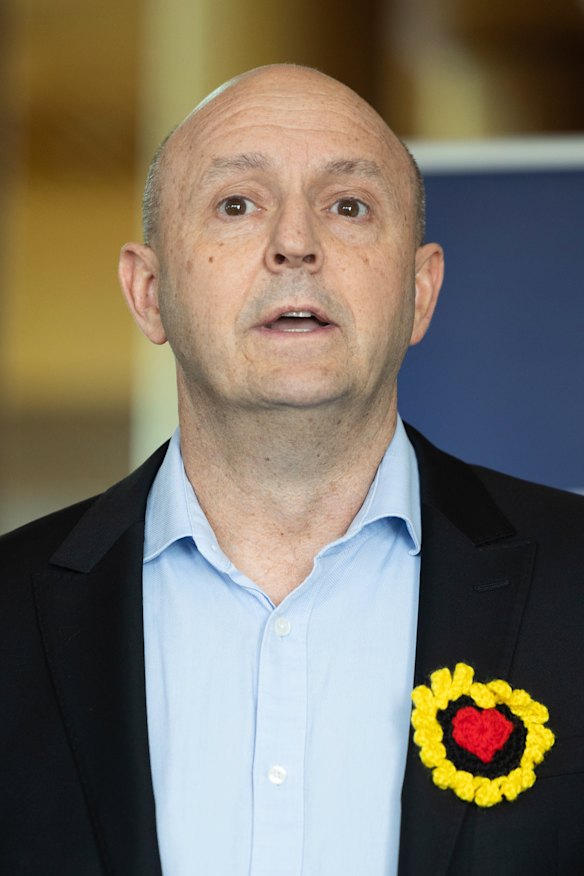
Dr Richard DennissCredit: The Sydney Morning Herald
Ross Gittins always manages to put the human condition in the forefront of economic rationalisation. His comparison of offshore gas taxes to student uni fees highlights the federal government’s priorities, and he does not paint a pretty picture. For readers, it is essential we understand and all push to right the current wrongs against our young adults, and it is important to remember that they vote, too. Janice Creenaune, Austinmer
Ross Gittins points out the claims made by Dr Richard Denniss are indeed true. The government takes more from poor students via HECS than from large multinationals in petroleum resource rent tax. This does not consider all the tax avoidance schemes by large conglomerates, small companies and private education. With their overwhelming government representation, this is a chance for Anthony Albanese’s Labor Party to make real changes and introduce major tax reform to this country. Gittins mentions Norway’s tax scheme on resources; this would be a good beginning for Albanese to apply to our mining resources, which Gittins reminds us are non-renewable. Mark Nugent, Lugarno
Please explain productivity
Productivity is flavour of the month and, as Shane Wright points out (“Rapid relief but there’s a sting in the tail of RBA’s statement”, August 13), that brings a focus on regulation. He notes that the RBA has received feedback from businesses that regulation is a key barrier to productivity growth. The Treasurer will be hosting a roundtable with a key focus on productivity. And yet, we know that all rules and regulations have a reason for existence; they address undesirable behaviours that we want stamped out. Professor Peter Shergold, former senior leader in the Australian Public Service (APS), once told a staff gathering that, for every rule or regulation that industry questioned, he could show you a minister who thought it was a good idea. Despite all the rules and regulations, how is it that we have egregious actions by banks (as identified by the royal commission), builders of apartment towers, aged care providers, childcare providers, super funds etc? The answer is simple, governments prefer writing new rules to resourcing regulators to take action. Regulators have too few staff to implement proper regulatory frameworks of informing, educating, monitoring and eventually taking action against non-compliant businesses. Ministers are strongly averse to taking actions that may threaten closure of businesses – they don’t want to be seen as the bad guys, and closing an aged care provider or childcare centre means those in care must be relocated. And it is individual businesses and business groups who fund political parties and lobby those same ministers. But, governments could stop writing new regulations that strangle good businesses, and maybe roll back some rules. Enforce the rules instead of adding to them. And stop ministers interfering in decisions about what action is taken and who is pursued. Steven Lee, Faulconbridge
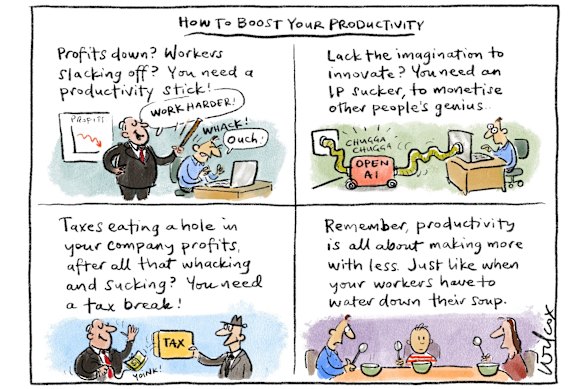
Credit: Cathy Wilcox
With the economic summit gabfest due shortly, we’re going to hear a lot about productivity. But could someone please explain what it is? To me, productivity means me working fewer hours for more money, but for industry – and judging by their actions over time – productivity means working more for less money to provide more profits that are kept by the owners. Dan O’Regan, Blacktown
Tied up in knots
I suggest those planning to spend more than they can comfortably afford on a wedding dress and reception are too immature to tie the knot (“For the modern wedding, one has become two (at least)” August 13). Marriage is meant to be a lifetime commitment. Focus on that, and don’t get carried away by the dress and the cake if you want your marriage to last. Graham Lum, North Rocks

Do you really need to do this? Let alone twice?Credit: iStock
I ask myself why would the young forego individual freedom of choice for the formulaic, forfeit any semblance of fun and spend a fortune to boot? The word vanity springs to mind. Helen Lewin, Tumbi Umbi
Restoring our river
Our family often drove across the Ryde bridge (“Once foul-smelling river is now at heart of second CBD”, August 13). If we were unfortunate enough to be travelling at low tide, the smell from the river around where the old Philips factory at Rhodes was, was nauseating. We even joked that the fish in the river there glowed in the dark. It’s been a long and slow process, but it’s great to see the river returning to its pre-industrial condition. Peter Miniutti, Ashbury
Aussie talent, anyone?

Be honest, wouldn’t you rather have Our Kylie?Credit: Joe Armao
Why has the AFL hired an American rapper to perform at the biggest event of the year for a unique and quintessentially Australian football game (“CBD”, August 13)? So Kylie Minogue wasn’t willing, but surely there is another high-profile Australian performer available and happy to do this gig. Irrespective of one’s opinion of the talent of Snoop Dogg, why do we use such an important occasion to further kowtow to the Americanisation of our music industry? Rob Phillips, North Epping
State the reserve
There is one simple way to take the guesswork out of house auctions (Letters, August 13). It must be legislated that vendors state the reserve price at the start of the campaign, not just an hour before the auction commences. To do so would give buyers a much clearer picture of if they are even in the race, and agents need not make wild guesses regarding price guides. If the property sells for more, then the market decided what the property was worth. John Swanton, Coogee
- To submit a letter to the Sydney Morning Herald, email [email protected]. Click here for tips on how to submit letters.
- The Opinion newsletter is a weekly wrap of views that will challenge, champion and inform. Sign up here.
Read the full article here







